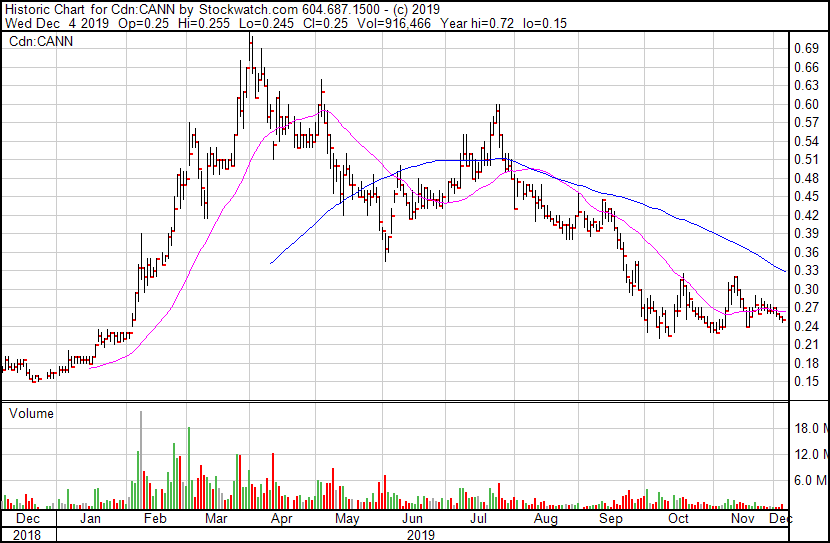An announcement Wednesday about Heritage Cannabis’ (CSE:CANN) rollout of their EndoDNA cannabinoid-based DNA test kit in Canada has cast the extractor as a modern innovator in custom cannabis medicine. The test kit invites anyone with $264 to spit on a Q-tip, mail it to a lab, and be furnished with an “in-depth, scientific report [that] shows how your unique genetic makeup may best respond to cannabis strains and formulations.”
People who have already done the DNA dance to discover information about their family lineage and genetic medical markers from popular test Co’s like 23andMe and Ancestry can just upload the data and have their custom report generated for $65.

The size of the market for people interested in genetic cannabinoid profiles is unknown. To the extent such a profile could help direct use and dosage as advertised, it seems useful. But details are sparse on just how useful it is. Here at the relative beginning of widespread legalization and availability, cannabis science is still in its infancy. The cannabis world will surely be watching to see how these profiles come out, and how the users do with the recommendations.
The business case here is a puzzle. Heritage hasn’t said anything about the direct revenue or margin that they expect from this venture, but these businesses are rarely done for the subscriber revenue. Endocanna Health, Inc.’s consumer DNA test contemporaries aren’t embarking on an enormous exercise to collect a laboratory fee from their subscribers. The growing database of genetic information that 23&Me, Ancestry, etc. collect in the process of creating user reports is the asset that the companies are building. Once the data is linked to the users who gave it up, and once those users are linked to each other, the indexed information can be sold in whole or in part over and over again, or licensed by subscription to any number of well funded research institutions, law enforcement organizations, healthcare providers, health insurance companies, etc.
The test kit site, endodna.ca makes a show on the front page of not having any intention of selling or sharing the information that they gain from their clients, but the site’s terms of service are less reassuring. They state that by giving Endocanna any content “you grant Endocanna a sub-licensable, worldwide, royalty-free license to host, store, copy, publish, distribute, provide access to, create derivative works of, and otherwise use such content to the extent and in the form or context we deem appropriate on or through any media or medium and with any technology or devices now known or hereafter developed or discovered.”

Heritage should get the benefit of the doubt for data re-sale or sharing, as the competing services’ data banks surely have them out-competed. And in any event, the what doesn’t seem quite as important as the how.
The company seems confident that it can make drug recommendations to its users, and includes a lifetime of updates as data becomes available, but there is no part of the Heritage or Endocanna literature that outlines how the cannabinoid profiles that they’re selling to subscribers are generated, or where they gained the knowledge necessary to do it.
The reports generated by 23 and Me and Ancestry match subscriber DNA against known medically-relevant genetic markers and family lineage data that has itself been matched up to genetic profiles and is further verified or adjusted as the user bases grow. Those companies employ data science teams to look at the data received from their submissions, identify new patterns, confirm them, and use them to improve the product in terms of both output and process. For that type of mapping to be done on the effects of cannabinoids on individual genetic profile, there would have to be a concerted sampling effort, consisting of a great deal of clinical testing in a lab environment to ensure the data was being gathered accurately.
The concept that cannabis science is of interest and value to the cannabis industry is obvious, and Heritage Cannabis CEO Clint Sharples appears to understand that, calling the Canadian launch of the testing kit product “part of a greater strategy of utilizing science as we look to expand our medical offerings in the Canadian market.”
Sharples doesn’t say much about the clinical legwork of that science-based strategy. One might infer that it’s being conducted by the company’s research subsidiary, Calyx Life Sciences Corp., which was incorporated in December of 2018 to “develop tools resources and methods to simplify and normalize the use of medical cannabis while at the same time optimizing the health outcomes for patients through a personalized and scientific approach to cannabinoid therapy.” They haven’t said much about how that’s going so far. Calyx doesn’t have a website or any literature. The portion of the Heritage website site dedicated to the business is presently referring to the science subsidiary as “BriteLife Sciences,” a name it had shed in favor of “Calyx” as of this past July.


The Calyx operation cost Heritage an unknown share of $53,798 in consulting fees that quarter. Heritage also paid a physician $16,000 in consulting fees, but it doesn’t say whether or not that physician was Calyx’ Chief Science Officer, Naturopath Dr. Chris Spooner whose primary practice in Vernon, BC doubles as a yoga studio.

The “expanding” of Heritage’s product offerings that CEO Sharples tips might come as welcome news to CANN shareholders. None of the company’s three extraction subsidiaries (Cannacure Corp., Voyage Cannabis or Purefarma Solutions) list any products on their websites at this time, and the DNA gathering is the only activity that resembles a campaign to establish a relationship with cannabis patients.
Heritage Cannabis last traded at $0.24 on the CSE.
Information for this analysis was found via Sedar and Heritage Cannabis. The author has no securities or affiliations related to this organization. Not a recommendation to buy or sell. Always do additional research and consult a professional before purchasing a security.








